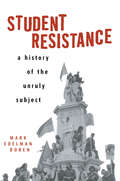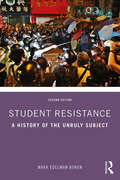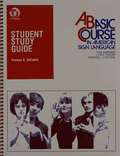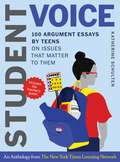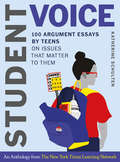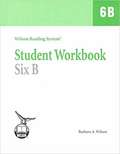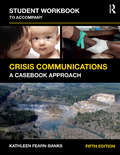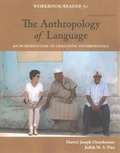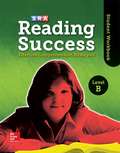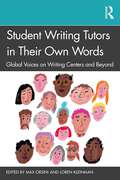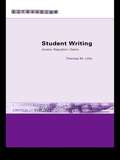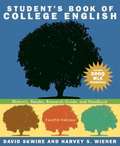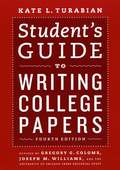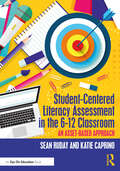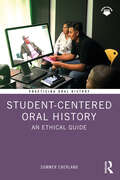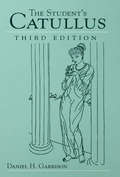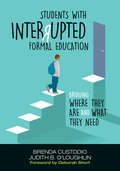- Table View
- List View
Student Resistance: A History of the Unruly Subject
by Mark Edelman BorenStudent Resistance is an international history of student activism. Chronicling 500 years of strife between activists and the academy, Mark Edelman Boren unearths the defiant roots of the ivory tower.
Student Resistance: A History of the Unruly Subject
by Mark Edelman BorenStudent Resistance: A History of the Unruly Subject observes the rise and progression of student activism across the globe. By selecting critical case studies from the medieval to modern period, Mark Boren reveals how friction between activists and the academy can culminate in a violent struggle for power. Using a uniquely international approach, the book offers a comprehensive introduction to the history of university activism and its influence on national politics and broader social movements. Specific instances of resistance, from medieval uprisings across European universities to the Tiananmen Square Massacre, are explored to produce a detailed historical study of power relations and oppression. Globalization and rapid technological advances have established more accessible platforms for collective activism whilst recent political upsets have generated a ripe environment for students to increase their efforts of resistance. This second edition addresses repercussions of the internet and social media age on the evolution of campus activism in the United States and abroad, from #blacklivesmatter to the Palestinian West Bank protests. This timely revision of Student Resistance continues to reflect on the vital role that resistance plays in the evolution of modern societies and the book remains an essential text for both students and scholars of youth activism.
Student Study Guide for use with Traditions and Encounters, A Global Perspective on the Past, Volume 1, From the Beginning to 1500
by Jerry H. Bentley Herbert F. Ziegler Rose Mary SheldonNIMAC-sourced textbook
Student Study Guide to a Basic Course in American Sign Language
by Tom Humphries Carol Padden Terrence J. O'Rourke Frank A. PaulStudent Study Guide to a Basic Course in American Sign Language
Student Test Prep Booklet: Lesson 200-204 (Fountas & Pinnell LLI Purple #Level W)
by Fountas PinnellLeveled Literacy Intervention PURPLE System Student Test Preparation Booklet: LEVEL W LESSONS 201-204
Student Test Preparation Booklet Level L: Lessons 29-32 (Fountas & Pinnell LLI Red #Level L)
by HeinemannStudent Test Preparation Booklet LEVEL L LESSONS 29-32
Student Test Preparation Booklet Level Q: Lessons 189-192 (Fountas & Pinnell LLI Red #Level Q)
by HeinemannStudent Test Preparation Booklet LEVEL Q LESSONS 189-192
Student Voice Teacher's Special: From The New York Times Learning Network
by Katherine SchultenHelp your students craft convincing arguments with award-winning mentor texts written by teenagers and companion teaching guide. This bundle includes one copy each of Student Voice: 100 Argument Essays by Teens on Issues That Matter to Them and Raising Student Voice: 35 Ways to Help Students Write Better Argument Essays, from The New York Times Learning Network. At a time when examples of “student voice” are everywhere, from Greta Thunberg to the Parkland students to the teenagers in the streets of Hong Kong, the argument writing that students study in school is still almost entirely written by adults. It is a wholly different experience for teenagers to study the work of their peers. It’s relatable. It’s relevant. And it doesn’t feel like an untouchable ideal. In this new collection of 100 essays curated by The New York Times, students will find mentor texts written by their peers—13-18-year olds—on a wide range of topics including social media, race, school lockdown drills, immigration, tackle football, the #MeToo movement, and COVID-19. For any teacher who feels that students write better when they have some choice over the topic and form, when they write for an audience beyond the teacher and a purpose beyond a grade, and when they get to sound like themselves, this anthology is an invaluable resource to accompany any composition text. In the companion teacher’s guide, Katherine Schulten—a former teacher and writing coach herself—provides teachers with 35 strategies and classroom-ready activities for using these peer mentor texts with their students. Raising Student Voice also includes 500 writing prompts, a “topic generator” with questions to help students decide what they’d like to write about, and a sample essay annotated with the comments of Times judges.
Student Voice: 100 Argument Essays By Teens On Issues That Matter To Them
by Katherine SchultenFinally, mentor texts written by teenagers, to help your students craft convincing arguments. In this new collection of 100 essays curated by The New York Times, students will find mentor texts written by their peers—13-to-18-year-olds—on a wide range of topics, including social media, race, video games, lockdown drills, immigration, tackle football, and the #MeToo movement. All of the essays were either winners or runners-up from The New York Times Learning Network 2014–2019 Student Editorial contests, in which students could take on any issue they liked and, in 450 words or fewer, persuade readers—including educators from around the country as well as Times judges—to adopt their point of view. The essays have been selected for their voice, style, and use of evidence, as well as to present snapshot of issues across a dozen categories that are of particular interest to adolescents. Student Voice is also available as a package with Raising Student Voice: 35 Ways to Help Students Write Better Argument Essays, from The New York Times Learning Network, a teacher's companion guide packed with practical advice from teachers, Times editors, and even student winners about how to use these essays in writing instruction.
Student Workbook Six B (Wilson Reading System)
by Barabara WilsonWilson Reading System, Student Workbook Six B Third Edition by Barabara Wilson.
Student Workbook to Accompany Crisis Communications: A Casebook Approach
by Kathleen Fearn-Banks Kathleen Fearn_BanksNo company, organization, or individual whose livelihood depends on public reaction can afford to function without a crisis communications plan. This student workbook reviews the critical terminologies, processes, and skills needed for understanding and responding to crises. It prepares individuals for responding to crises in a variety of contexts, and reinforces strategies and tactics to be used during a crisis. Chapters include instructive case studies of public relations professionals in crises: what they did, what they wished they had done, and what hampered their progress. The exercises provide students with the opportunity to respond to real-world crises, sharpening their own skills and practicing response behaviors. This workbook will serve as a useful tool for all future practitioners.
Student Workbook with Reader for Anthropology Of Language: An Introduction To Linguistic Anthropology
by Harriet Ottenheimer Judith PineThe workbook/reader provides classic and contemporary exercises and readings as well as information on how to complete the semester-long guided projects. Each Chapter includes a reading, writing/discussion exercises, and guided projects. Exercises range from beginning to intermediate in skill level, with a few advanced exercises included.
Student Workbook, Level B [Grade 5]
by Bob DixonHelp your students gain and master essential comprehension skills and strategies with SRA Reading Success. This supplemental reading program requires only 25 minutes, three days per week, to make a dramatic improvement in a student's ability to understand what they read. The program builds vocabulary skills by helping students derive meaning from context, and adds to students' general word knowledge through a wide variety of high-interest readings. In addition, it is designed to help students transfer this knowledge to improve their performance on national and state assessments. With SRA Reading Success you teach students to comprehend by teaching them explicit comprehension strategies that can be applied to any reading task, including: Determining the main idea and supporting details Identifying an author's purpose Paraphrasing and summarising Drawing inferences Using context to figure out word meanings
Student Writing Tutors in Their Own Words: Global Voices on Writing Centers and Beyond
by Max OrsiniStudent Writing Tutors in Their Own Words collects personal narratives from writing tutors around the world, providing tutors, faculty, and writing center professionals with a diverse and experience-based understanding of the writing support process. Filling a major gap in the research on writing center theory, first-year writing pedagogy, and higher education academic support resources, this book provides narrative evidence of students' own experiences with learning assistance discourse communities. It features a variety of voices that address how academic support resources such as writing centers have served as the nucleus for students' (i.e., both tutors and their clients) sense of community and self, ultimately providing a space for freedom of discourse and expression. It includes narratives from writing tutors supporting students in unconventional spaces such as prisons, tutors offering support in war-torn countries, and students in international centers facing challenges of distance learning, access, and language barriers. The essays in this collection reveal pedagogical takeaways and insights about both student and tutor collaborative experiences in writing center spaces. These essays are a valuable resource for student writing tutors and anyone involved with them, including composition instructors and scholars, writing center professionals, and any faculty or administrators involved with academic support programs.
Student Writing Tutors in Their Own Words: Global Voices on Writing Centers and Beyond
by Max OrsiniStudent Writing Tutors in Their Own Words collects personal narratives from writing tutors around the world, providing tutors, faculty, and writing center professionals with a diverse and experience-based understanding of the writing support process.Filling a major gap in the research on writing center theory, first-year writing pedagogy, and higher education academic support resources, this book provides narrative evidence of students' own experiences with learning assistance discourse communities. It features a variety of voices that address how academic support resources such as writing centers have served as the nucleus for students' (i.e., both tutors and their clients) sense of community and self, ultimately providing a space for freedom of discourse and expression. It includes narratives from writing tutors supporting students in unconventional spaces such as prisons, tutors offering support in war-torn countries, and students in international centers facing challenges of distance learning, access, and language barriers. The essays in this collection reveal pedagogical takeaways and insights about both student and tutor collaborative experiences in writing center spaces.These essays are a valuable resource for student writing tutors and anyone involved with them, including composition instructors and scholars, writing center professionals, and any faculty or administrators involved with academic support programs.
Student Writing: Access, Regulation, Desire (Literacies)
by Theresa M. LillisStudent Writing presents an accessible and thought-provoking study of academic writing practices. Informed by 'composition' research from the US and 'academic literacies studies' from the UK, the book challenges current official discourse on writing as a 'skill'. Lillis argues for an approach which sees student writing as social practice.The book draws extensively on a three-year study with ten non-traditional students in higher education and their experience of academic writing. Using case study material - including literacy history interviews, extended discussions with students about their writing of discipline specific essays, and extracts from essays - Lillis identifies the following as three significant dimensions to academic writing: * Access to higher education and to its language and literacy representational resources * Regulation of meaning making in academic writing* Desire for participation in higher education and for choices over ways of meaning in academic writing. Student Writing: access, regulation, desire raises questions about why academics write as they do, who benefits from such writing, which meanings are valued and how, on what terms 'outsiders' get to be 'insiders' and at what costs.
Student's Book of College English: Rhetoric, Reader, Research Guide, and Handbook
by David Skwire Harvey S. WienerThis rhetoric/reader/research guide/handbook offers students a complete course in writing in the rhetorical modes. This 12th edition offers sound instruction in the rhetorical strategies, strong professional and student readings, thorough coverage of argumentation and research, and a reference handbook with self-test exercises.
Student's Book of College English: Rhetoric, Reader, Research Guide, and Handbook
by David Skwire Harvey WienerA complete course in writing, in one comprehensive volume <P><P> Acclaimed for its clarity and accessibility, Student’s Book of College English, Fourteenth Edition offers a rhetoric, reader, research guide, and handbook in one cohesive and efficient presentation. The rhetoric appeals to students with its straightforward and jargon-free style. Instructors appreciate its coverage of the writing process, the rhetorical modes (including argumentation), and its chapter on writing about literature. The reader includes selections from sources ranging from academia to the Internet on timely topics that pique students’ interest. The in-depth coverage of research methods, as well as the complete treatment of grammar and usage, make an ancillary handbook unnecessary, a cost-savings enjoyed by students and teachers alike.
Student's Guide to Writing College Papers (4th edition)
by Joseph M. Williams Kate L. Turabian Gregory G. ColombThis new edition is both a solid introduction to the research process and a convenient handbook to the best practices of writing college papers.
Student-Centered Literacy Assessment in the 6-12 Classroom: An Asset-Based Approach
by Sean Ruday Katie CaprinoIn this practical and accessible book, you’ll learn how to create equitable and meaningful assessments in your instruction through an inquiry-based approach. Ruday and Caprino reimagine what asset-based literacy assessments can be and what they look like in practice by understanding that effective, asset-based literacy assessments must center on students: they must incorporate students’ unique perspectives, ideas, and experiences in meaningful and relevant ways. Instead of using assessments that focus on identifying what students don’t know, the practices presented in this book provide authentic opportunities for students to use what they do know to demonstrate their knowledge of important literacy concepts. The book is organized into three easy-to-use parts that cover: Key concepts of asset-based assessment Specific ways that these practices can be put into action Putting it all together in your own education context. A great resource for busy teachers, this book features a guide for teachers to use during professional development book studies and ready-to-implement templates when applying the assessment practices described in the book.
Student-Centered Oral History: An Ethical Guide (Practicing Oral History)
by Summer CherlandStudent-Centered Oral History explores the overlaps of culturally relevant teaching, student-centered teaching, and oral history to demonstrate how this method empowers students, especially those from historically underrepresented communities. With tangible tools like lesson plans and reflection sheets, available to download as eResources from the book's website, each interactive chapter is applicable to classrooms and age groups across the globe. Educators from all levels of experience will benefit from step-by-step guides and lesson plans, all organized around guiding questions. These lessons coach students and educators from start to finish through a student-centered oral history. Background research, historical context, cultivating a culture of consent, analysis, promotion, and gratitude are among the many lessons taught beyond writing questions and interviewing. With a specific focus on the ethics influencing a teacher’s role as guide and grader of a student-centered oral history, this book also highlights successful approaches across the world of students and teachers discovering oral history. These examples reveal how student-centered oral history empowers academic achievement, radicalizes knowledge, develops relationships, and promotes community engagement. This book is a useful tool for any students and scholars interested in oral history in an educational setting.
Students Catullus: Third Edition (Oklahoma Series In Classical Culture #Vol. 5)
by Daniel H. GarrisonFirst published in 2004. Routledge is an imprint of Taylor & Francis, an informa company.
Students With Interrupted Formal Education: Bridging Where They Are and What They Need
by Brenda K. Custodio Judith B. O′LoughlinNew hope for our most vulnerable English learners "One of the guiding principles of effective English language teaching is for educators to know their students. And that in a nutshell captures the value of this book. . . . The compassion that Custodio and O’Loughlin feel for our SIFE students, the commitment they have to educating them well, and the comprehension they have of the assets these learners bring to the classroom are evident in the writing, tools, and vignettes they share." -Deborah J. Short Under the best of circumstances, the academic demands of today’s classrooms can be daunting to our English learners. But for the tens of thousands of newly arrived students with interrupted formal education, even the social challenges can be outright overwhelming. Rely on this all-in-one guide from Brenda Custodio and Judith O’Loughlin for expert insight on how to build the skills these students need for success in school and beyond. Inside you’ll find Essential background on factors leading to interrupted education Specific focus on refugee children and Latino immigrants Guidance on building internal resilience for long-term social and emotional health Recommendations for creating supportive environments at the classroom, school, and district level About one thing, Brenda and Judith are absolutely convinced: our SIFE students can learn and make progress, often at a remarkable speed. But it’s up to us, their educators, to provide the time, attention, and a specific focus. Consider this book your first step forward.

